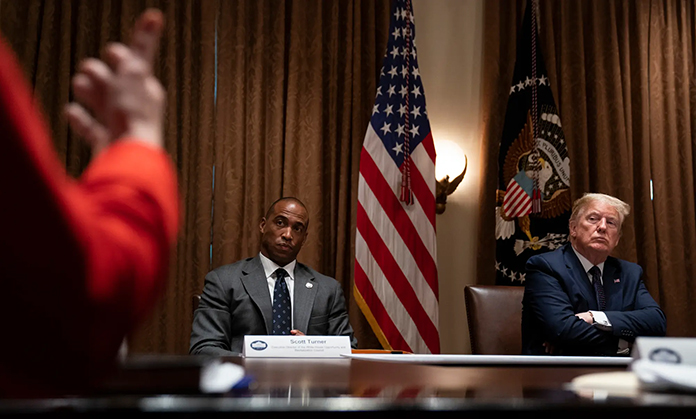If the incident involving Dominique Strauss-Kahn had taken place in Paris rather than New York, the complainant would have likely been talked out of pressing charges, said Abigail Saguy, a sociologist at the University of California in Los Angeles.
“I think it is definitely unthinkable, and this is the reason why people in France are so stunned that this has happened,” said Saguy, author of the 2003 book What is Sexual Harassment? From Capitol Hill to the Sorbonne.
Strauss-Kahn has resigned from his post as managing director of the International Monetary Fund, faces criminal charges, while his friends have reportedly contacted the family of the maid who he is alleged to have sexually assaulted to pay them to drop the case, according to the New York Post.
Saguy said if an identical incident involving Strauss-Kahn occurred in France, the results would have been far different.
France’s tightly connected political, economic and media elites would have been hostile to the idea that a migrant, single mother from Africa could destroy the reputation and career of a highly-respected man who many expected would become France’s president next year, the expert said.
“I think she would have been strongly encouraged not to come forward, and if she were to come forward with it, I think she would have been met with negativity and she wouldn’t have been taken seriously.”
Saguy, who earned her doctorate at both Princeton University in N.J. and L’Ecole des hautes etudes en sciences sociales in Paris, said the U.S. approach to sexual harassment may well have played a role in Strauss-Kahn’s arrest.
In France, rape, sexual assault, sexual harassment and exhibitionism are all in the French Penal Code, with the latter two offences prosecuted as misdemeanors. She said the law, passed in the 1990s, is not enforced rigorously and women often feel their claims against important men are not taken seriously.
In the U.S. sexual-harassment cases are fought in civil courts, often, though not exclusively, on the basis of the 1964 Civil Rights Act, which prohibits workplace discrimination on the basis of categories such as race, religion and sex. Because corporations rather than individuals are held liable in harassment cases, companies have a huge incentive to protect workers, since successful claims can result in multimillion-dollar judgments.
Reports indicate that both police and hotel staff acted rapidly to secure Strauss-Kahn’s arrest after a woman working in housekeeping claimed that he confined and attempted to rape her in his $3,000-a-night Sofitel Hotel luxury suite.
“The fact the woman herself spoke up, it’s not something you can take for granted,” Saguy said of the 32-year-old woman, a widowed single mother from West Africa.
Changing rules
According the New York Times, the IMF has long been a “sharp-elbowed place ruled by alpha male economists” where U.S. law does not apply (even though it is located in Washington, D.C.) and where inappropriate sexual relationships flourished. Until recently the IMF’s own guidelines stated that “intimate personal relationships between supervisors and subordinates do not, in themselves, constitute harassment.”
While technically such an interpretation of sexual harassment may be true, the skill required to successfully navigate that definition is usually beyond the clumsy grope of those who seek its protection.
Even consensual hanky-panky can quickly morph into a quid pro quo power play that is no longer consensual. Furthermore, exchanges of sex for promotions, raises, or plum assignments can turn even a consensual relationship into a hostile environment for those who don’t enjoy pillow talk benefits. Either way, consensual or non-consensual romantic relationships between supervisors and subordinates add an unnecessary layer of complexity and a big downside risk to business.
Even the IMF has reportedly recognized that tacitly approving or encouraging romantic relationships in the workplace is playing with fire. A new code of conduct adopted May 6 says such relationships with subordinates “are likely to result in conflicts of interest” and must be disclosed. Guess you could say they’re having a change of heart.
What all this means for your business is that it pays to periodically conduct a reality check about open secrets in the workplace. Open secrets are those elephants in the room that everyone knows exist but are suffered in silence for a variety of political reasons. The elephants don’t have to relate to sexual harassment. It could be the superstar leasing person who continuously beat forecasts and everyone “knows” is doing something improper. It could be the bullying boss who destroys morale but is an ace politician who manages up the chain of command much better than down. It could be the person in accounts payable or purchasing who inexplicably lives a lifestyle that exceeds their means. Those are just a few examples and they are by no means conclusive or exclusive.
What all open secrets have in common is that they detract from organizational effectiveness and put the organization at risk. They are predictable surprises. Worst of all such boorish behavior can manifest itself outside the circle of those who uphold the code of silence, like a hotel room maid exposing both the “Emperor’s New Clothes” and a legal line being crossed, and then the party is over.
The collateral damage can be extensive. It’s double trouble and altogether more trouble than it can possibly be worth. That’s exactly why getting ahead of the liability curve is a good business investment. It’s always better for you to expose and stamp out open secrets privately than for a plaintiff, the government, or the media (including social media) to do it publicly.
Our changing world
Sexual harassment, in general, may have become so commonplace for women that they have built up resistance to harassing behavior they consider merely “bothersome,” suggests the newest study by Michigan State University researchers. This effect, said lead investigator Isis Settles, may be similar to the way people build up immunity to infection following exposure to a virus.
“When women view sexual harassment as bothersome, it doesn’t seem to be associated with distress,” said Settles, associate professor of psychology. “In some ways this suggests that sexual harassment is such a widespread problem that women have figured out ways to deal with it so it doesn’t interfere with their psychological well-being.”
Sexual harassment was a problem for both sexes, the study found. More than 50 percent of women and nearly 20 percent of men reported at least one incident of sexual harassment during a 12-month period.
The study is one of the first to examine how both men and women view harassment—whether they saw it as bothersome or frightening—and how these perceptions relate to their psychological well-being, Settles said. The survey covered 16 types of verbal and physical harassment, including offensive stories or jokes and touching that made the person uncomfortable.
For women, sexual harassment was distressing when they saw it as frightening, but not when they saw it as bothersome. “We were surprised by this finding,” Settles said. “We thought women would be negatively impacted if they saw their harassment as frightening or bothersome.”
For men, sexual harassment was distressing when they saw it as either frightening or bothersome, she said.
“People tend to underestimate the impact of sexual harassment on men,” Settles said. She added that men “typically haven’t had a lifetime of experiences dealing with sexual harassment and may not know how to deal with it when it happens to them.”
Settles said the study does not suggest sexual harassment is less distressing for women than men.
Female managers beware
In 2009, ground-breaking research regarding women in the workplace created significant buzz. The first-ever, large-scale, longitudinal study to examine workplace power, gender and sexual harassment, contended that female supervisors are more likely to be the targets of sexual harassment than women in lower-level positions.
Surprised? One might think that a managerial title might offer a female employee some protection, but the study’s findings did not support that presumption.
The research concluded that nearly fifty percent of women supervisors, but only onethird of women who do not supervise others, reported sexual harassment in the workplace. In more conservative models with stringent statistical controls, women supervisors were 137 percent more likely to be sexually harassed than women who did not hold managerial roles.
“The study provides the strongest evidence to date supporting the theory that sexual harassment is less about sexual desire than about control and domination,” said Heather McLaughlin, University of Minnesota sociologist and the study’s primary author, adding that “male co-workers, clients and supervisors seem to be using harassment as an equalizer against women in power.” While supervisory status increased the likelihood of harassment among women, it did not significantly impact the likelihood for men.
In addition to workplace power, the sociologists found that gender expression was also a strong predictor of workplace harassment. More effeminate men were at a greater risk of experiencing more severe or multiple forms of sexual harassment, as were those employees who self-identified as non-heterosexual.
Sexual harassment facts
Thanks to recent headlines, Supreme Court decisions, highly publicized lawsuits and huge settlements, sexual harassment has become a hot topic. Yet, most people are still confused about the difference between acceptable behavior and harassment. Is flirting okay? Casual hugs? A dinner invitation?
The problem is that there are no hard and fast answers to these questions. Cases of sexual harassment are as unique as the individuals involved. What one person labels harassment another may consider acceptable behavior. This subjective element is the source of much of the confusion surrounding sexual harassment.
Fortunately, there are facts that can help you understand this important issue and inform your workplace choices.
What is Sexual Harassment? Sexual harassment in the workplace is a violation of Title VII of the Civil Rights Act of 1964. A brief definition of sexual harassment is, “unwanted sexual advances or visual, verbal, or physical conduct of a sexual nature.”
The U.S. Equal Employment Opportunity Commission (E.E.O.C.) provides a more complete definition, “Unwanted sexual advances, requests for sexual favors, and other verbal and physical conduct of a sexual nature when submission to such conduct is made explicitly or implicitly a term or condition of an individual’s employment, or submission to, or rejection of such conduct by an individual is used as the basis for employment decisions affecting such individual, or such conduct has the purpose or effect of unreasonably interfering with an individual’s work performance or creating an intimidating, hostile or offensive working environment.
Two forms of sexual harassment are: Quid pro quo, which occurs when an employee is forced to submit to unwelcome advances or attention to get or keep their job, even if this is “just understood” and not explicitly stated; submitting to, or rejecting the harassment is the basis for an employment decision that affects the employee.
The second is a hostile environment which exists when the harassment itself is intended to or does interfere with the person’s work or creates “an intimidating, hostile, or offensive work environment,” whether or not there is any other unfavorable job action.
















